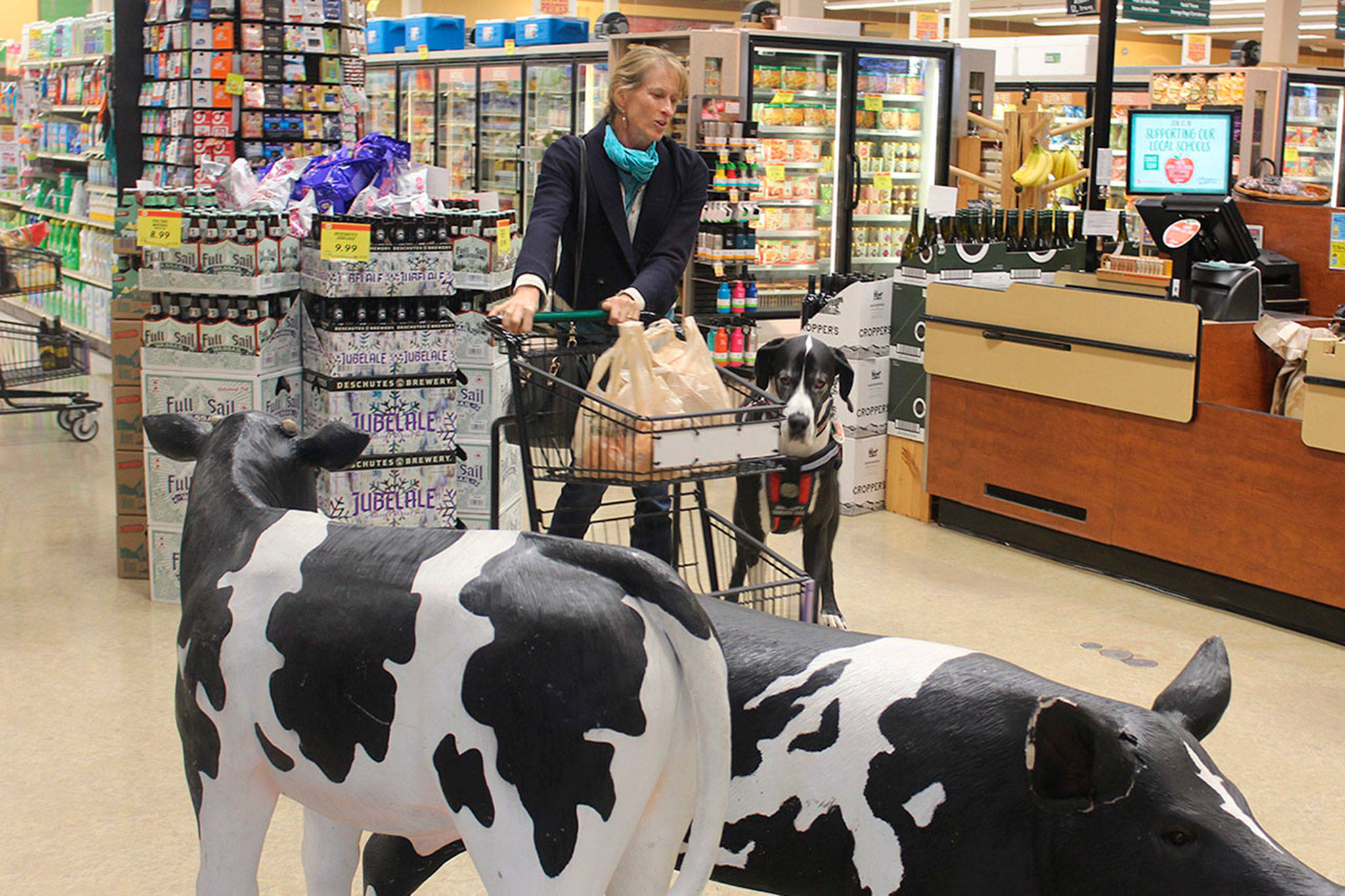Please ignore Renee Le Verrier.
That may be hard when you see her out and about in Oak Harbor at the grocery store, the post office, the library accompanied by a huge black dog that outweighs her by 30 lbs. and looks at you through big, droopy brown eyes.
They’re working. Don’t disturb them.
The Great Dane service dog named Tommy is helping Le Verrier stay upright. Le Verrier, meanwhile, must concentrate on doing just that.
Distracting Tommy could send her stumbling, tumbling, crashing to the floor.
“All six of our feet have to work together,” she says.
Diagnosed with Parkinson’s disease more than a decade ago at age 43, Le Verrier’s body is no longer under her control.
Sometimes her arms are a whirligig. Other times, she turns into a statue, legs freezing in place.
“That middle ground is really hard to find,” she says.
She takes handfuls of medication to help control these Parkinson’s symptoms, known as dyskinesia and bradykinesia, respectively.
Sometimes they help, sometimes they don’t.
“It’s like a finicky disease,” she says. “Your brain knows how to feed all those neurons to your body but it won’t. Sometimes the planets aren’t aligning for me. It could be how I ate, what I ate, did I sleep?”
She also must watch her protein intake because protein interferes with the absorption of her medication.
With Tommy at her side, the fear of falling or freezing is lessened. It allows her to keep moving, which seems both her mantra and mission.
“I can be more independent,” she says. “Just knowing he’s around gives me confidence.”
While Parkinson’s restricts movement on Le Verrier’s right side, a childhood stroke limited mobility on her left side. Sensing she was “running out of sides,” she decided to apply for a service dog.
Le Verrier met Tommy as a puppy about six years ago at the Service Dog Project, located on a 12-acre farm in Ipswich, Mass. The nonprofit trains Great Danes to assist people with movement disorders, such as multiple sclerosis, cerebral palsy and Parkinson’s.
She and Tommy had to prove they could form the fierce bond needed for a dog-human service relationship.
How that happened is a sweet story, one of many in “Travels with Tommy: Stories of Life with a Service Dog.” Le Verrier wrote it and recently self-published it.
The use of Great Danes as mobility, or balance dogs, is relatively new. Le Verrier’s short essays provide insight into their daily lives — how they talk, walk and function as a team 24/7.
When working, Tommy wears a vest and a harness with a metal fixture that Le Verrier can grab for balance.
Le Verrier is tall and thin, weighing 110 lbs. Tommy is also tall but statuesque, weighing 140 lbs. He’s the perfect height as a “Great Dane cane,” one of many nicknames Le Verrier’s bestowed on him.
(The other is Sir Thomas because “he’s so regal and it looks like he’s wearing a tuxedo.”)
Le Verrier and her husband and son moved to Whidbey Island in the fall of 2015. Longtime New Englanders, they wanted to escape mounds of snow and icy sidewalks and streets.
In just two years, Le Verrier has established herself as a local yoga instructor, writer, painter and movement motivator with the Northwest Parkinson’s Foundation.
She teaches yoga for people with movement disorders at Lotus Tea in Oak Harbor and she teaches online via a streaming program.
Le Verrier strongly believes in research that points to regular exercise as the best way to manage Parkinson’s and slow down its progressive march.
“I walk every day what I call the driveway walk,” she says. “I do some kind of stretching and yoga.” She also rides a tandem bike with her husband, plays a “Parkinson’s version” of tennis and she likes to box.
Sometimes, Le Verrier seems resigned to the fact that her dog is a magnet for attention.
“I know it’s like I’m wearing a sandwich board when I go out in public,” she jokes.
No matter how many of Tommy’s collars, harnesses and vests say, “Mobility Service Dog,” or “Do Not Pet,” people still do.
Even a tag showing a large red stop sign with the words, “I’m working, Ignore Me,” do nothing to deter the gawkers and talkers.
But she knows she’s an unusual sight so she tries to see the humor in the situations, which she writes about in her book.
Constantly in motion, both physically and mentally, Le Verrier has also written several books on yoga, and she just penned a novel. Her acrylic paintings currently hang at the Oak Harbor Library as she’s the featured artist for January and February.
Most of her paintings are bright depictions of flowers, especially tulips as they represent a cure for Parkinson’s.
Facing art critics or entering juried art shows doesn’t faze the 56-year-old athlete/yoga instructor/author/painter/mother/wife/Great Dane lover.
“Once you’re diagnosed with a nasty degenerative disease without a cure, you get over the intimidation factor.”
For more information on Renee Le Verrier books, yoga or service dog: www.leverrier.com
Excerpts from “Travels with Tommy: Stories of Life with a Service Dog.”
“Sometimes it’s like being on a dream date with those soulful, adoring and adorable eyes, waiting and wanting to please. Other times, it’s more like being leashed to a giant toddler, always on alert for pooping and drooling, lavishing praise for leaving squirrels alone dead or alive. Mostly, it’s like a strong partnership, thriving on communication, respect and companionship.”
“We’re like at old couple that way, walking in sync, aware of each other’s quirks, leaning and being there to lean on. If I’m walking through the living room and reach my hand out, I don’t need to say anything. He knows he can saunter over for pets and ear scratches. If I’m stepping through the living room and reach my left palm down, he knows he needs to scramble to get his shoulders under that hand to stabilize me.”


